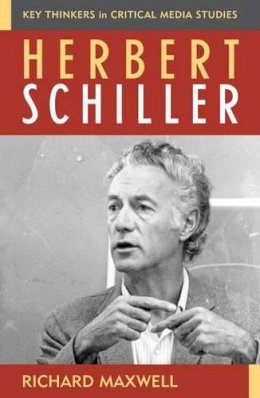
Stock image for illustration purposes only - book cover, edition or condition may vary.
Herbert Schiller
Richard Maxwell
€ 139.30
FREE Delivery in Ireland
Description for Herbert Schiller
Hardback. Herbert I. Schiller (1919-2000) has been called America's most original and influential media analyst of the left in the twentieth century. Maxwell's timely book fuses biography and history in a digest of Schiller's major works to reveal their continuing relevance for critical communication studies. Series: Critical Media Studies: Institutions, Politics, and Culture. Num Pages: 176 pages, bibliography, index. BIC Classification: BG; JFD. Category: (P) Professional & Vocational; (UP) Postgraduate, Research & Scholarly; (UU) Undergraduate. Dimension: 236 x 158 x 18. Weight in Grams: 376.
Hailed as America's most original and influential media analyst of the left, Herbert I. Schiller (1919-2000) was a pioneer of critical communication studies. Beginning in the 1960s with a blast of radical writings and speeches, Schiller broke the silence in communication studies on U.S. imperialism and cold war information policy, challenged private business schemes to commercialize the public supply of information, revealed government policies that helped create the market-based information economy, and demystified the hype of computerized wonders in the information age. Schiller's research on cultural imperialism became a vital thread in the global struggle against American Empire and transnational corporate media power. Maxwell's synthesis fuses biography with a digest of Herbert Schiller's major works to illustrate how his core ideas and concerns are anchored to the times in which he lived: from the Great Depression and world war, to national liberation struggles and the radicalism of 1960s, to the rise of the extreme right in the American political economy of the 1980s and 1990s.
Product Details
Publisher
Rowman & Littlefield
Format
Hardback
Publication date
2003
Series
Critical Media Studies: Institutions, Politics, and Culture
Condition
New
Weight
375g
Number of Pages
176
Place of Publication
Lanham, MD, United States
ISBN
9780742518476
SKU
V9780742518476
Shipping Time
Usually ships in 15 to 20 working days
Ref
99-15
About Richard Maxwell
Richard Maxwell is professor of media studies at Queens College, City University of New York.
Reviews for Herbert Schiller
This is a useful overview of an influential academic and his work. Recommended.
CHOICE
A must-read for anyone who wants an introduction to Schiller or just simply wants to know more about him. A succinct and useful overview of Schiller's ideas. . . . For those interested in Schiller's writings and legacy, Herbert Schiller is a worthwhile read: it contains useful insights and, it should be noted, a tidy bibliography of his publications.
Global Media and Communication
Herbert Schiller was the foremost critical media intellectual of the twentieth century. His insights into corporate domination of the U.S. media are still fresh and dynamic, forty years after they first appeared. And Richard Maxwell is the ideal chronicler and analyst of Schiller's legacy. This accessible yet brilliant text shows us why his ideas are of continuing importance and how we can apply them at a crucial moment in world history.
Toby Miller, New York University
CHOICE
A must-read for anyone who wants an introduction to Schiller or just simply wants to know more about him. A succinct and useful overview of Schiller's ideas. . . . For those interested in Schiller's writings and legacy, Herbert Schiller is a worthwhile read: it contains useful insights and, it should be noted, a tidy bibliography of his publications.
Global Media and Communication
Herbert Schiller was the foremost critical media intellectual of the twentieth century. His insights into corporate domination of the U.S. media are still fresh and dynamic, forty years after they first appeared. And Richard Maxwell is the ideal chronicler and analyst of Schiller's legacy. This accessible yet brilliant text shows us why his ideas are of continuing importance and how we can apply them at a crucial moment in world history.
Toby Miller, New York University
